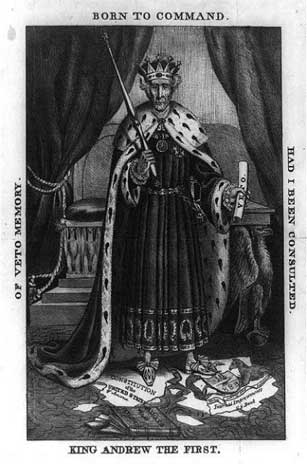As part of the defense of New Orleans against the threat of British invasion, Andrew Jackson assumed military control of the area, suspending civil authority. His refusal to lift martial law long after the British had left raised questions about civilian supremacy and the protection of civil liberties in wartime.
“Those who are not for us are against us.” Major General Andrew Jackson

Library of Congress, Prints and Photographs Division
In December 1814 General Andrew Jackson arrived in New Orleans to shore up the city’s defenses against an anticipated British invasion. He encountered a civilian population with its morale in shambles. Some were resigned to defeat; others in a state of panic; still others ambivalent about the possibility of invasion. In part to address flagging civilian will, Jackson declared martial law. It was the first such declaration in United States history. Jackson proclaimed “those who are not for us are against us, and will be dealt with accordingly.”
Jackson’s men won a spectacular victory against the British at the Battle of New Orleans in January. But even with the threat of invasion checked, Jackson still refused to lift his order instituting martial law for months afterward. The open-ended order made many civilians uncomfortable. A Louisiana State senator expressed unease about the ongoing state of martial law in a March 3 newspaper article; Jackson promptly had the senator arrested. When a U.S. District Court Judge demanded that the senator be charged or released, Jackson not only refused, he ordered the judge jailed before banishing him from the city. (When Jackson eventually lifted martial law, the returned judge proceeded to charge him with contempt and levied a thousand-dollar fine, which the “Hero of New Orleans” paid.)
From a military perspective, Jackson’s decision to impose martial law made good sense, at least initially. It facilitated a more dependable supply system for Jackson’s soldiers, curbed civilian spying, and helped maintain order and discipline among the panicked populace.
But Jackson’s refusal to lift the order for months after British forces no longer posed a threat exposed a more obstinate side of the general. That image would haunt him politically for years to come. And Jackson’s perceived heavy-handedness highlighted raised fundamental questions about civilians’ supremacy over the military and the challenge of safeguarding civil liberties in wartime.
Last updated: May 24, 2016
